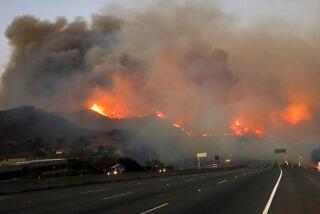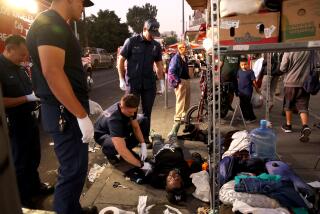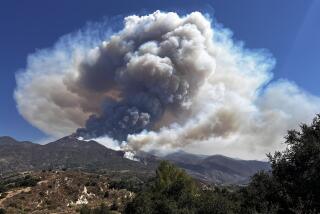Long Beach to Get Fire, Paramedic Duty in Signal Hill
Los Angeles County has agreed in principle to turn its Signal Hill firefighting and paramedic duties over to the Long Beach Fire Department, a move officials say will improve service and save money.
Under an agreement still being refined, the county-run Consolidated Fire Protection District would pay Long Beach $500,000 a year to provide all fire services to the 2.5-square-mile city it encircles.
The arrangement, which could be in place by December, would save the county about $150,000 annually while Long Beach would receive the $500,000 without having to hire more firefighters or buy more equipment, officials say.
Long Beach would provide the added services by shifting one fire-engine crew to the Signal Hill station and by dispatching firefighters and paramedics from several other stations nearby. The change is expected to slightly reduce response time to fires and slash average paramedic response time from 15 minutes to between two and four minutes.
The county responded to 761 fire and paramedic calls from Signal Hill in 1986, according to Signal Hill officials.
âThis is a situation you donât encounter very often, where everyone seems to benefit,â City Manager Robert Williams said.
The three-party contract could be ready in a few days for forwarding to the two city councils and then the county supervisors for approval by mid-November, according to county negotiator Ray Brunstrom, a deputy fire chief.
No Drawbacks Seen
Brunstrom said John W. Englund, chief of the financially strapped county fire district, has decided that âwe will write an agreement with Long Beach to provide this service. We still have to iron out the periods and the commas.â
Long Beach, Signal Hill and county officials all said they could see no drawbacks to the agreement.
One possible concern is the proposed transfer of a four-man engine crew from Long Beach Airport to the Signal Hill Fire Station half a mile south at 27th Street and Raymond Avenue.
But John Williams, deputy city manager in Long Beach, said, âIn our view we have lost nothing.â The fire engine now stationed at the airport responded to just six airport fires in 1986 out of 543 total runs, he said.
Four pieces of specialized airport fire equipment and four firefighters will remain at the airport station, and four other fire stations are within half a mile of the runways, the deputy manager said.
Response time to airport fires may occasionally even be better with the transfer of an engine company to the Signal Hill station, because it is also within a half mile of some runways, said Warren Harman, Long Beach deputy fire chief in charge of operations.
If everything goes as expected, Long Beachâs four-man crews could replace the countyâs three-person crews in Signal Hill by Dec. 1 and certainly by the end of the year, Brunstrom said.
5 Stations Ring City
âLong Beach can provide services equal to or exceeding those we can provide,â he said.
While the county has only one fire station in Signal Hill and another within two miles in Lakewood, five Long Beach stations ring the 8,000-resident city and will be dispatched depending on where fires are, Long Beach officials said.
Paramedic service could be expected to improve most, they said. Paramedics are now dispatched from the countyâs Paramount Boulevard station in Lakewood, four miles from some sections of Signal Hill, while Long Beach has three paramedic stations within about one mile of Signal Hill, Harman said.
Long Beach will also provide fire prevention services such as inspection of buildings by fire marshals, said deputy manager Williams. He said the city may eventually hire more inspectors, which, along with minor station maintenance costs, could reduce the cityâs gain from the contract to $450,000 a year.
County officials say the transfer of services in Signal Hill is one small part of the struggle by the countywide Consolidated Fire Protection District to remain solvent and effective. The district, which serves unincorporated county areas and 46 cities, faces a $15-million deficit this fiscal year and is trying to find ways to pay its bills without closing fire stations.
Tax Bases Frozen
The deficit is caused by cuts in state support and low fire-protection payments from a number of cities--including Signal Hill, Industry and Cerritos--whose property tax bases have been frozen through the redevelopment process, said James Hunt, a county deputy chief.
The county fire district receives a fixed percentage of the base property tax revenue of its participating cities, but taxes on all new construction within city redevelopment zones are kept by city redevelopment agencies. Therefore, new construction increases the demand for fire protection but brings no new money for it, Hunt said.
Signal Hill City Manager Williams acknowledged the problem but said officials in his city have been unwilling to increase fire-service payments, which the county says are now $500,000 a year, compared to costs of about $1 million.
About $650,000 pays for operation of the Signal Hill station and the rest for support services like paramedics and ladder crews from outside the city, Hunt said. The Long Beach contract would reduce direct costs from $650,000 to $500,000, he said. The overhead costs will remain because those services are used by a number of other cities and must be maintained, he said.
More to Read
Sign up for Essential California
The most important California stories and recommendations in your inbox every morning.
You may occasionally receive promotional content from the Los Angeles Times.










